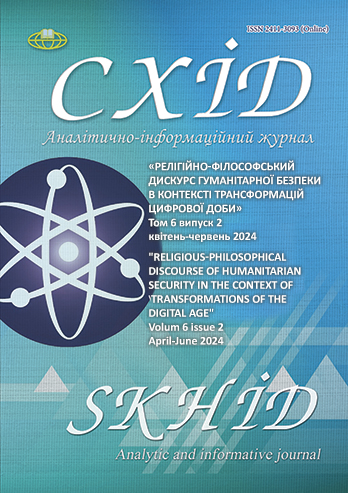Features of the social beliefs of the Orthodox Church and Christians of the Evangelical Faith
DOI:
https://doi.org/10.21847/2411-3093.628Keywords:
social creeds, Orthodoxy, Christians of the Evangelical Faith, Ukrainian Orthodox Church, Ecumenical Orthodoxy, spiritual educationAbstract
The article examines the peculiarities of social beliefs of the Orthodox Church and Christians of the Evangelical Faith and their reflection in educational practices. It is shown that the formation of social doctrines is one of the basic tasks of modern Christianity. Social doctrine systematizes and actualizes the role and significance of social beliefs of Christianity, in their essence multi-vector, multi-dimensionality, inte-gration as the main characteristics of the spiritual sphere of the church. Social doc-trines are based on various aspects of theological and ecclesiological beliefs. They can be expressions of the theological tradition’s response to historical problems, social transformations of the digital age, in the confessional discourse, and can also reflect the modern view of a certain church on the issue of the relationship between faith and reason, science and religion, and humanitarian security. Approaches to social beliefs may differ depending on the "confessional color" of a certain religious organization and the information support of this process. According to this study, the implementation of the social doctrines of Christianity is impossible without an analysis of their beliefs aimed at solving both social issues in general and educa-tional ones. The need to develop basic strategies of spiritual education is empha-sized, outline the priorities facing education in a secularized world, but also suggest the development of sustainable concepts in the direction of highlighting the confes-sional worldview regarding the challenges of modern humanitarianism. It is proposed to consider the peculiarities of social beliefs in the system of educational processes of the Orthodox Church and the Christian Church of the Evangelical Faith. The con-clusions emphasize that the social doctrine of the Ecumenical Patriarchate presup-poses a progressive attitude to science and technological progress, encourages the church to use the resources of technological progress and informational resources for preaching. The need for the introduction of an integrated approach in spiritual education, constant informational innovations in the field of training of qualified min-isters who are able to conduct missionary preaching activities taking into account the conditions of the time for an efficient educational process and humanitarian security in the context of transformations of the digital age is being updated.
Downloads
References
Chernets, V., Stadnyk, M., Marukhovska-Kartunova, O., Kolybabiuk, S., & Svorak, S. (2023). The impact of Russian military aggression on the establishment of a new Ukrainian political nation: El impacto de la agresión militar rusa en el establecimiento de una nueva nación política ucraniana. Cuestiones Polí-ticas, 41(78), 357–373. https://doi.org/10.46398/cuestpol.¬4178.25
Chornomorets, Yu. (2020). Prospects for the develop-ment of spiritual education in Ukraine. Filosofiia osvity, 26 (2), 8 – 24 https://doi.org/10.31874/2309-1606-2020-26-2-1 (In Ukrainian)
Deliatynskyi, R., Hohol, V. (2023). Theological education and science as means of formation of civil society in Ukraine. Grani, 26(3), 6-19. https://doi.org/-10.15421/172342 (In Ukrainian)
Dzhi, D. (2022). Spiritual gifts. https://www.chve.-org.ua/duhovni-dary-d-dji/ (In Ukrainian)
Lomachіnska, I., Uzhva, V. Religious education in Ukraine: problems and prospects. The Сaucasus. 2020. 38 (4). 68 – 72 (In Ukrainian)
Lomachinska, I., Martych, R. (2021). Religious Education in the European Educational Space: Social and Cul-tural Context. Studia Warmińskie, 58. 173 – 187. https://doi.org/10.31648/sw.7014
Lomachіnska, I., Deineha, Ye., Uzhva, V. (2021). The mission of social service in the theological educa-tional discourse. Osvitnii dyskurs: zbirnyk naukovykh prats. 38(11-12). 85 -95 https://doi.org/10.33930/ed.2019.5007.38(11-12)-9 (In Ukrainian)
Riazantseva, T. (2020). Theology of education: Catholic, Orthodox and Protestant concepts. Virtus. 79 – 83. (In Ukrainian)
Stadnyk, M. (2006). The transformation of the relation-ship between Christianity and science: the religious-philosophical aspect. Pereialav-Khmelnytskyi. (In Ukrainian)
Vynohradov, V. (2017a). Social service of Evangelical Christians https://poklik.org/sotsialne-sluzhinnya-yevangelskyh-hrystyyan/ (In Ukrainian)
Vynohradov, V. (2017b). Development of education in the Ukrainian Church of Evangelical Christians. https://poklik.org/rozvytok-osvity-v-ukrayinskij-tserkvi-hrystyyan-viry-yevangelskoyi/ (In Ukrainian)
Vynohradov, V. (2017c). Evangelical Christians in sci-ence and education of Ukraine. https://poklik.org/-yevangelski-hrystyyany-v-nautsi-ta-osviti-ukrayiny/ (In Ukrainian)
Downloads
Published
How to Cite
Issue
Section
License
Copyright (c) 2024 Микола Стадник, Владислав Харченко

This work is licensed under a Creative Commons Attribution-NonCommercial-NoDerivatives 4.0 International License.
1. Authors bear responsibility for the accuracy of facts, quotations, numbers and names used.
2. Manuscripts are not sent back.
3. The publisher does not always agree with the authors' opinion.
4. The authors reserve the right to authorship of the work and pass the first publication right of this work to the journal under the terms of a Creative Commons Attribution-NonCommercial-NoDerivatives 4.0 International License. This license allows others to distribute (copy) the published work for non-commercial purposes, provided there is mandatory attribution to its authors and a link to the first publication in our journal.
5. The authors have the right to conclude separate supplement agreements that relate to non-exclusive work distribution in the form in which it has been published by the journal (for example, to upload the work to the online storage of the journal or publish it as part of a monograph), provided that the reference to the first publication of the work in this journal is included.

